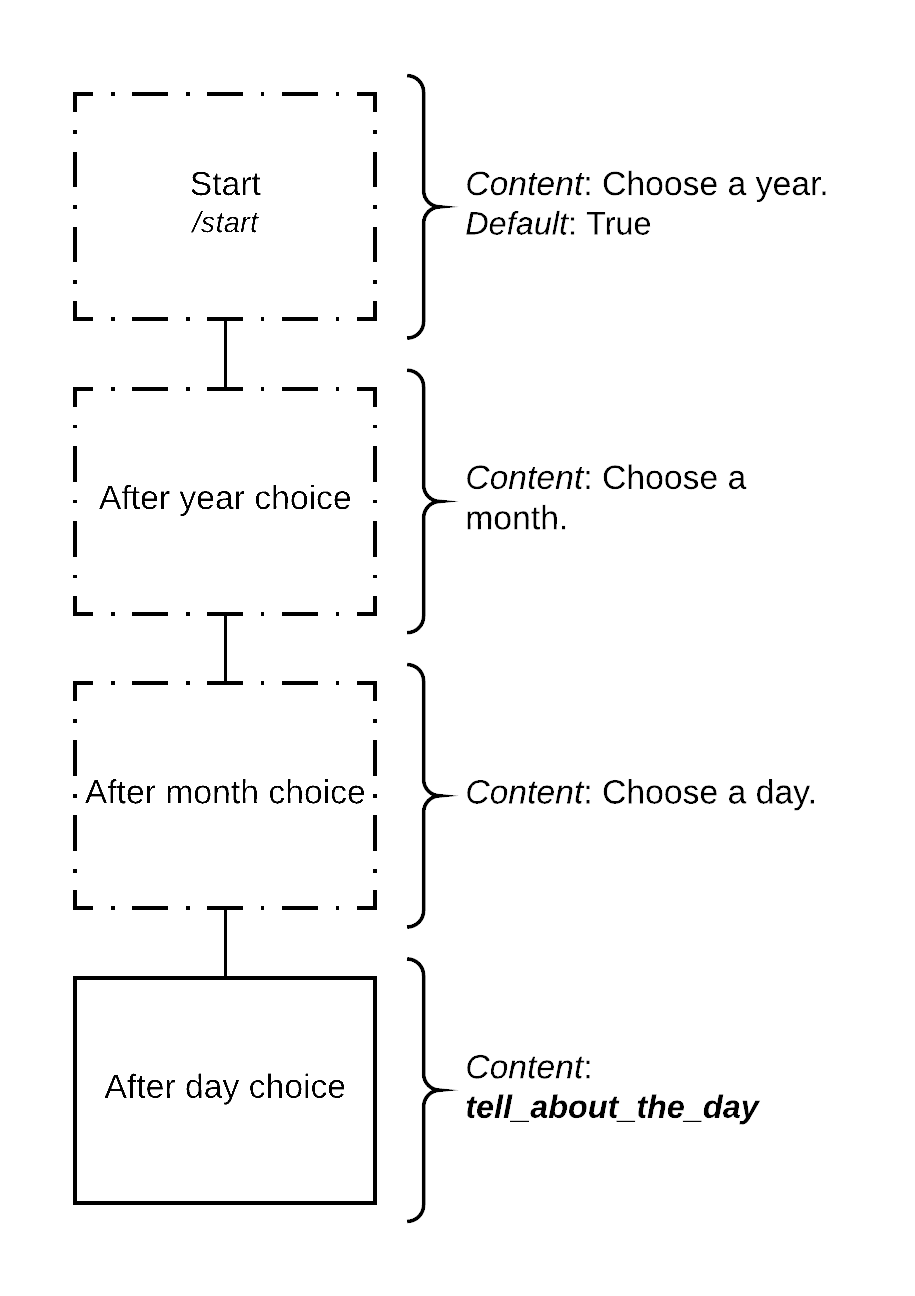Calendar Bot¶
Note
In order to make use of the proposed example, you need to
set your own environment by creating a file named .env
and configuring all the variables from sample.env.
See also
Check the Flowchart guidelines to understand how the structure is built.
Structure¶

Source code¶
# Pyrubrum - An intuitive framework for creating Telegram bots
# Copyright (C) 2020 Hearot <https://github.com/hearot>
#
# This file is part of Pyrubrum.
#
# Pyrubrum is free software: you can redistribute it and/or modify
# it under the terms of the GNU General Public License as published by
# the Free Software Foundation, either version 3 of the License, or
# (at your option) any later version.
#
# Pyrubrum is distributed in the hope that it will be useful,
# but WITHOUT ANY WARRANTY; without even the implied warranty of
# MERCHANTABILITY or FITNESS FOR A PARTICULAR PURPOSE. See the
# GNU General Public License for more details.
#
# You should have received a copy of the GNU General Public License
# along with Pyrubrum. If not, see <https://www.gnu.org/licenses/>.
from calendar import monthrange
from datetime import datetime
from typing import Set
from typing import Union
from environs import Env
from pyrogram import Client
from pyrubrum import DictDatabase
from pyrubrum import Element
from pyrubrum import Menu
from pyrubrum import Node
from pyrubrum import PageMenu
from pyrubrum import PageStyle
from pyrubrum import ParameterizedHandler
from pyrubrum import RedisDatabase
from pyrubrum import transform
try:
from redis import Redis
except (ImportError, ModuleNotFoundError):
pass
def generate_days(handler, client, context, parameters):
month = int(parameters["month_id"])
year = int(parameters["year_id"])
return [
Element(str(day + 1), str(day + 1))
for day in range(monthrange(year, month)[1])
]
def generate_months():
return [Element(str(month + 1), str(month + 1)) for month in range(12)]
def generate_years(start: int, end: int):
return [Element(str(year), str(year)) for year in range(start, end + 1)]
def tell_about_the_day(handler, client, context, parameters):
day = int(parameters["day_id"])
month = int(parameters["month_id"])
year = int(parameters["year_id"])
return "📅 " + datetime(year, month, day).strftime("%d/%m/%Y is a %A.")
tree = transform(
{
PageMenu(
"Start",
"start",
"📅 Choose a year.",
generate_years(1970, 2044),
default=True,
style=PageStyle(limit=4, limit_items=15),
): {
PageMenu(
"After year choice",
"year",
"📅 Choose a month.",
generate_months(),
style=PageStyle(limit=5, limit_items=12),
): {
PageMenu(
"After month choice",
"month",
"📅 Choose a day.",
generate_days,
style=PageStyle(limit=5, limit_items=31),
): {Menu("After day choice", "day", tell_about_the_day)}
}
}
}
)
def main(
api_hash: str,
api_id: int,
bot_token: str,
database: Union[DictDatabase, RedisDatabase],
session_name: str,
tree: Set[Node],
):
bot = Client(
session_name, api_hash=api_hash, api_id=api_id, bot_token=bot_token
)
handler = ParameterizedHandler(tree, database)
handler.setup(bot)
bot.run()
if __name__ == "__main__":
env = Env()
env.read_env()
api_hash = env("API_HASH")
api_id = env.int("API_ID")
bot_token = env("BOT_TOKEN")
session_name = env("SESSION_NAME")
if env.bool("USE_REDIS", False):
db = env.int("REDIS_DB")
host = env("REDIS_HOST")
port = env.int("REDIS_PORT")
database = RedisDatabase(Redis(host=host, port=port, db=db))
else:
database = DictDatabase()
main(api_hash, api_id, bot_token, database, session_name, tree)